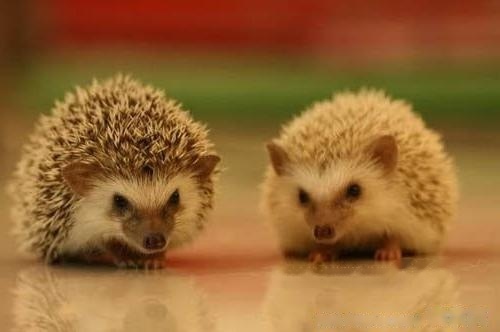Hedgehogs are very adaptable and have little environmental requirements. However, hedgehogs have the habit of being quiet and afraid of light, and they are nocturnal and nocturnal. It is best to choose a quiet place with less human interference for family breeding. Because it is not very mobile, you can use the cages used for raising birds or cats, or you can use wooden boxes or cardboard boxes as the hedgehog's home. The box can be covered with hay, pine leaves or straw, but with about 5 cm Pine chips are best, as long as the box is not cramped and has enough room to move around.

In addition, put a cat toilet and cat litter in the corner of the box as its toilet, then its smell will be much less. You can usually put it on the floor at home and watch it play with it. It should be noted that due to its isothermal properties, although it can withstand low temperatures, it is still necessary to pay attention to its warmth in winter. Generally, the temperature should be controlled between 23 and 27 degrees Celsius, and the humidity should be controlled below 40%. would not choose to hibernate. Such simple living needs are also the advantage of hedgehogs that distinguish them from other pets.
Hedgehogs are nocturnal animals, mostly active in the early morning and dusk, and mostly sleep at other times, sleeping for more than 10 hours a day. But because hedgehogs have a fast metabolism, they need a lot of food to supplement their calories. Hedgehogs are omnivores, and in the wild they mainly live by preying on various invertebrates and small vertebrates, as well as grass roots, fruits, melons and other plants. When feeding at home, they can prepare their own feed and feed them in proportion to meat, grain and by-products, and vegetables.
Animal feed is the main feed, earthworms, mealworms, and crickets can all be used, as well as minced beef and mutton, but it must be fresh, hygienic and small pieces. Some large pet stores also have special feed for hedgehogs with balanced nutrition. Sometimes cat and dog feed is also a good staple food. Drinking water can be supplied from the drinking water tank of rabbit. Plant food can be fed with fresh and clean fruits and vegetables. Before feeding, it must be soaked in water for 1 hour to prevent gastrointestinal diseases. If food is placed in its brood box, the remaining uneaten food should be cleaned up safely, keeping the box clean.
Getting close to a hedgehog is really a difficult problem. However, there is always a way. The little hedgehog's thorns are not afraid. For an adult hedgehog, you can cross your hands and carefully hold it from below. A bare belly is fine, because its belly is full of hairs and has no thorns, as long as it is honest and doesn't move around, of course, it can do this after it is very familiar with you. If you are still afraid, then Just put on rubber gloves.
Hedgehogs are relatively adaptable, have fewer diseases, and have no infectious diseases. As long as they are properly reared, managed and hygienic, hedgehogs rarely get sick. The common diseases of hedgehogs are mainly gastroenteritis, dermatitis, parasites, etc. Doing a good job of prevention and smelting will make your baby healthy.
1. Gastroenteritis: Although it is a minor disease, it is sometimes fatal to hedgehogs. Hedgehogs suffering from gastroenteritis have dull spines, inability to walk, diarrhea, and refusal to eat. At this time, the amount of feed should be reduced, and oxytetracycline should be fed. One tablet is crushed and mixed into the feed for feeding, and it is fed 3 times a day. Gentamicin can also be injected, 25,000 units per intramuscular injection of the buttocks, but most people can't do it well.
2. Tinea: scaling skin is a symptom of tinea, which can be rubbed externally to treat tinea ointment and relax the skin. It can also be used to soak the cut tobacco in vinegar for 24 hours and then add trichlorfon (crushed and mixed) to rub the affected area, but it is not recommended to use the latter one.
3. Ascariasis: Hedgehogs with loss of appetite and sleepiness may have eaten unclean things, which may lead to the birth of ascaris in their stomachs. At this time, you can feed Ascaris net, 2 times a day, 1 tablet each time, for 2 days. Hedgehogs who are not suffering from ascariasis should also be dewormed twice a year to ensure the healthy growth of hedgehogs.
![[Dog Training 5] The training method of pet dog dining etiquette](/static/img/12192/12192_1.jpg)




